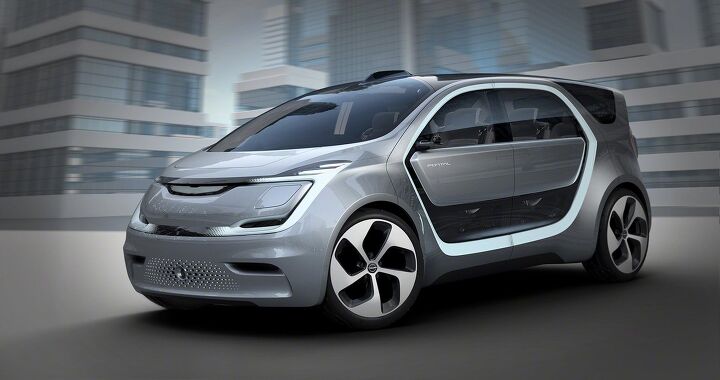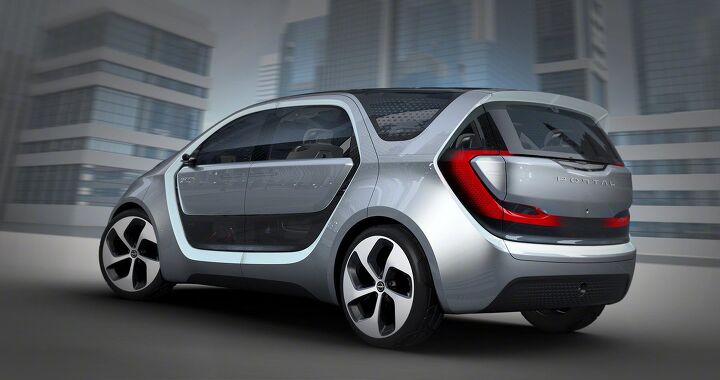Report: Stately, Ancient Chrysler 300 to Be Replaced by an Electric Minivan

The appearance of the unabashedly traditional, square-rigged Chrysler 300 in the mid-2000s inspired high-fives among car lovers sickened by the 1990s Ovoid Era. It’s unlikely those same revellers feel the same way about the 300 biting the dust to make room for a tech-savvy, electric minivan.
And yet, that’s what we’re hearing. In 2020, the last Chrysler passenger car will reportedly give way to a second Chrysler minivan, keeping the shrunken brand’s two-vehicle lineup intact. If only we could say the same for its heritage.
According to Automotive News Canada (subscription required), the Chrysler brand’s dropping of the dwindling 300 opens the door for a production version of the Chrysler Portal concept car — a highly configurable, six-passenger, zero-emission, minivan-like vehicle based on the Chrysler Pacifica. The concept debuted at the 2017 Consumer Electronics Show.
There’s more evidence to support the claim than refute it. For starters, FCA execs, including former CEO Sergio Marchionne, were loathe to discuss the 300’s future. Discussions about the future of its platform mates, the Dodge Challenger and Charger, failed to include the Chrysler sibling. (It seems the next generation of those vehicle will likely adopt a revamped version of the existing platform, rather than a modern Italian architecture, as had been long rumored.)
Bolstering this report, in June Marchionne said the Chrysler division would become a “people mover” brand under the automaker’s new five-year plan, with Dodge continuing on as a purveyor of performance vehicles (and Journeys). Also, the extremely long-in-the-tooth Dodge Grand Caravan needs to take that eternal slumber. It was only expected to kick around for another couple of years after the appearance of the Pacifica, which rolls out of the same Windsor, Ontario assembly plant. Go figure, buyers still love the Grand Caravan.
Suffice it to say, no one expects another generation of 300. Year to date, 300 volume in the U.S. is down 14 percent, and the model’s sales barely register in Canada, its country of origin. Last year’s U.S. tally of 51,237 vehicles pales in comparison to its first full year on the market (2005), when some 144,048 Americans stopped at a dealer to pick up their retro ride.
There’s equal evidence that the Portal is a vehicle FCA wants to build. Despite its concept car trappings — doors that slide open from the middle, retractable steering wheel — the Portal served as a Millennial-focused, tech-laden showpiece. Its electric drivetrain was something all OEMs feel people desire in a futuristic new car, while features like voice and facial recognition, plus the capability of Level 3 autonomy, covered the personalization and safety angles. No one expects a production Portal to boast all of these features.
Marchionne himself claimed he wanted another front-drive, minivan-type vehicle built in Windsor to replace the Grand Caravan, using the same architecture as the Pacifica. Also, FCA needs a serious EV (that isn’t the Fiat 500e) to save face with other automakers and placate the EPA.
For now, FCA isn’t talking about future products, so this report remains under the heading of “unconfirmed.”
[Images: Fiat Chrysler Automobiles]

More by Steph Willems
Latest Car Reviews
Read moreLatest Product Reviews
Read moreRecent Comments
- Slavuta Autonomous cars can be used by terrorists.
- W Conrad I'm not afraid of them, but they aren't needed for everyone or everywhere. Long haul and highway driving sure, but in the city, nope.
- Jalop1991 In a manner similar to PHEV being the correct answer, I declare RPVs to be the correct answer here.We're doing it with certain aircraft; why not with cars on the ground, using hardware and tools like Telsa's "FSD" or GM's "SuperCruise" as the base?Take the local Uber driver out of the car, and put him in a professional centralized environment from where he drives me around. The system and the individual car can have awareness as well as gates, but he's responsible for the driving.Put the tech into my car, and let me buy it as needed. I need someone else to drive me home; hit the button and voila, I've hired a driver for the moment. I don't want to drive 11 hours to my vacation spot; hire the remote pilot for that. When I get there, I have my car and he's still at his normal location, piloting cars for other people.The system would allow for driver rest period, like what's required for truckers, so I might end up with multiple people driving me to the coast. I don't care. And they don't have to be physically with me, therefore they can be way cheaper.Charge taxi-type per-mile rates. For long drives, offer per-trip rates. Offer subscriptions, including miles/hours. Whatever.(And for grins, dress the remote pilots all as Johnnie.)Start this out with big rigs. Take the trucker away from the long haul driving, and let him be there for emergencies and the short haul parts of the trip.And in a manner similar to PHEVs being discredited, I fully expect to be razzed for this brilliant idea (not unlike how Alan Kay wasn't recognized until many many years later for his Dynabook vision).
- B-BodyBuick84 Not afraid of AV's as I highly doubt they will ever be %100 viable for our roads. Stop-and-go downtown city or rush hour highway traffic? I can see that, but otherwise there's simply too many variables. Bad weather conditions, faded road lines or markings, reflective surfaces with glare, etc. There's also the issue of cultural norms. About a decade ago there was actually an online test called 'The Morality Machine' one could do online where you were in control of an AV and choose what action to take when a crash was inevitable. I think something like 2.5 million people across the world participated? For example, do you hit and most likely kill the elderly couple strolling across the crosswalk or crash the vehicle into a cement barrier and almost certainly cause the death of the vehicle occupants? What if it's a parent and child? In N. America 98% of people choose to hit the elderly couple and save themselves while in Asia, the exact opposite happened where 98% choose to hit the parent and child. Why? Cultural differences. Asia puts a lot of emphasis on respecting their elderly while N. America has a culture of 'save/ protect the children'. Are these AV's going to respect that culture? Is a VW Jetta or Buick Envision AV going to have different programming depending on whether it's sold in Canada or Taiwan? how's that going to effect legislation and legal battles when a crash inevitibly does happen? These are the true barriers to mass AV adoption, and in the 10 years since that test came out, there has been zero answers or progress on this matter. So no, I'm not afraid of AV's simply because with the exception of a few specific situations, most avenues are going to prove to be a dead-end for automakers.
- Mike Bradley Autonomous cars were developed in Silicon Valley. For new products there, the standard business plan is to put a barely-functioning product on the market right away and wait for the early-adopter customers to find the flaws. That's exactly what's happened. Detroit's plan is pretty much the opposite, but Detroit isn't developing this product. That's why dealers, for instance, haven't been trained in the cars.




































Comments
Join the conversation
So basically this is the vehicle that Chrysler should have saved the Pacifica badge for.
I wouldn't count the 300 out just yet. [No matter how sure of the rumors you may be] It basically owns the full-sized 'American' sedan market. And sales are UP for 2018.